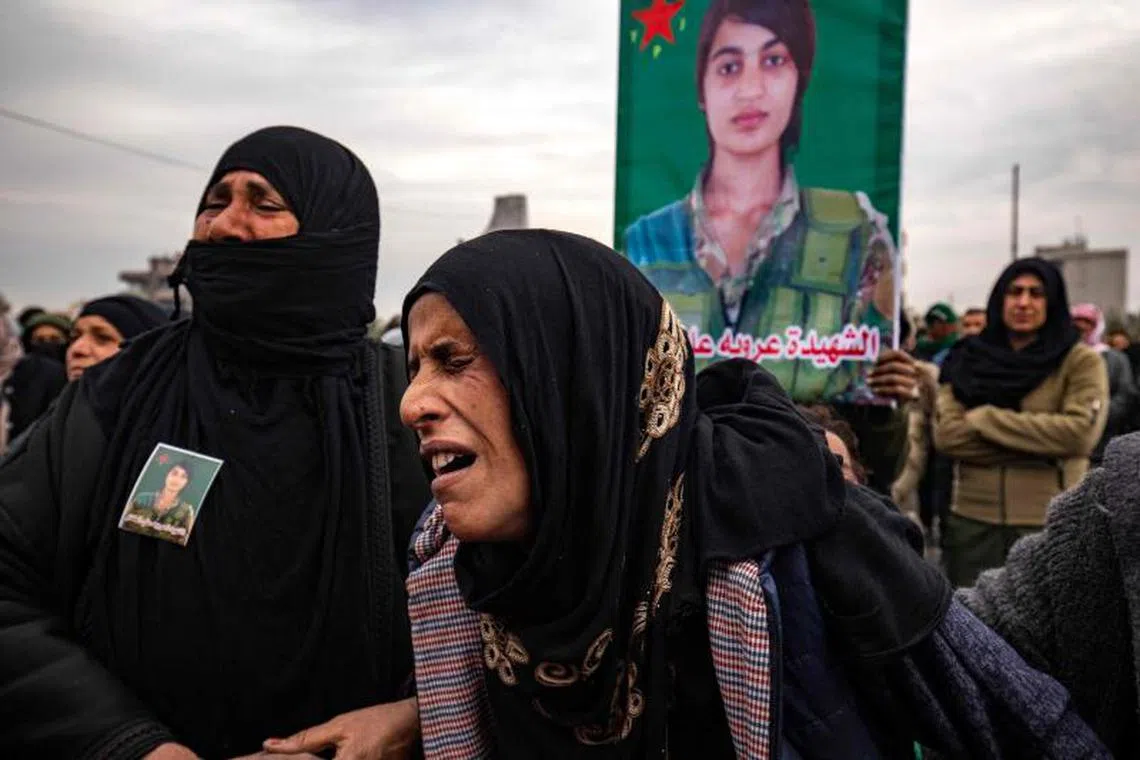Tensions in north-east Syria could bring ‘dramatic consequences’, says UN envoy
Sign up now: Get ST's newsletters delivered to your inbox

A relative mourning during the funeral of person killed during a Turkish drone strike in Syria’s north-east on Dec 22.
PHOTO: AFP
BEIRUT – Tensions in north-east Syria between the Kurdish-led authorities and Turkish-backed groups should be resolved politically or risk “dramatic consequences” for all of Syria, the UN envoy for the country Geir Pedersen told Reuters on Dec 23.
Hostilities have escalated between Syrian rebels backed by Ankara and the US-backed Syrian Democratic Forces (SDF) in the north-east since former Syrian president Bashar al-Assad was toppled on Dec 8.
Syrian armed groups seized the city of Manbij from the SDF on Dec 9 and could be preparing to attack the key city of Kobani, or Ayn al-Arab, on the northern border with Turkey.
“If the situation in the north-east is not handled correctly, it could be a very bad omen for the whole of Syria,” Mr Pedersen said by phone, adding that “if we fail here, it would have dramatic consequences when it comes to new displacement”.
The SDF – which is spearheaded by the Kurdish YPG – has proposed to withdraw its forces from the area in exchange for a complete truce. But Turkey’s Foreign Minister Hakan Fidan, speaking alongside Syria’s de facto new leader Ahmed al-Sharaa on Dec 22 in Damascus, said the YPG should disband totally.
Turkey regards the YPG as an extension of the Kurdistan Workers Party (PKK) militants who have fought an insurgency against the Turkish state and are deemed terrorists by Ankara, Washington and the European Union.
Mr Pedersen said a political solution “would require serious, serious compromises” and should be part of the “transitional phase” led by the new Syrian authorities in Damascus. Mr Fidan said he had discussed the YPG presence with the new Syrian administration and believed Damascus would take steps to ensure Syria’s territorial integrity and sovereignty.
Turkish President Recep Tayyip Erdogan said on Dec 23 the country will remain in close dialogue with Mr Sharaa. Kurdish groups have had autonomy across much of the north-east since Syria’s war began in 2011, but now fear it could be wiped out by the country’s new Islamist rule. Thousands of women rallied on Dec 23 in a north-east city to condemn Turkey and demand their rights be respected.
Mr Pedersen said Mr Sharaa had told him in meetings in Damascus last week that they were committed to “transitional arrangements that will be inclusive of all”.
But he said resolving tensions in the north-east would be a test for a new Syria after more than a half-century of Assad family rule.
“The whole question of creating a new, free Syria would be off to a very, extremely... to put it diplomatically, difficult start,” he said. REUTERS


